Josh’s Stage 4B Hodgkin’s Lymphoma Story
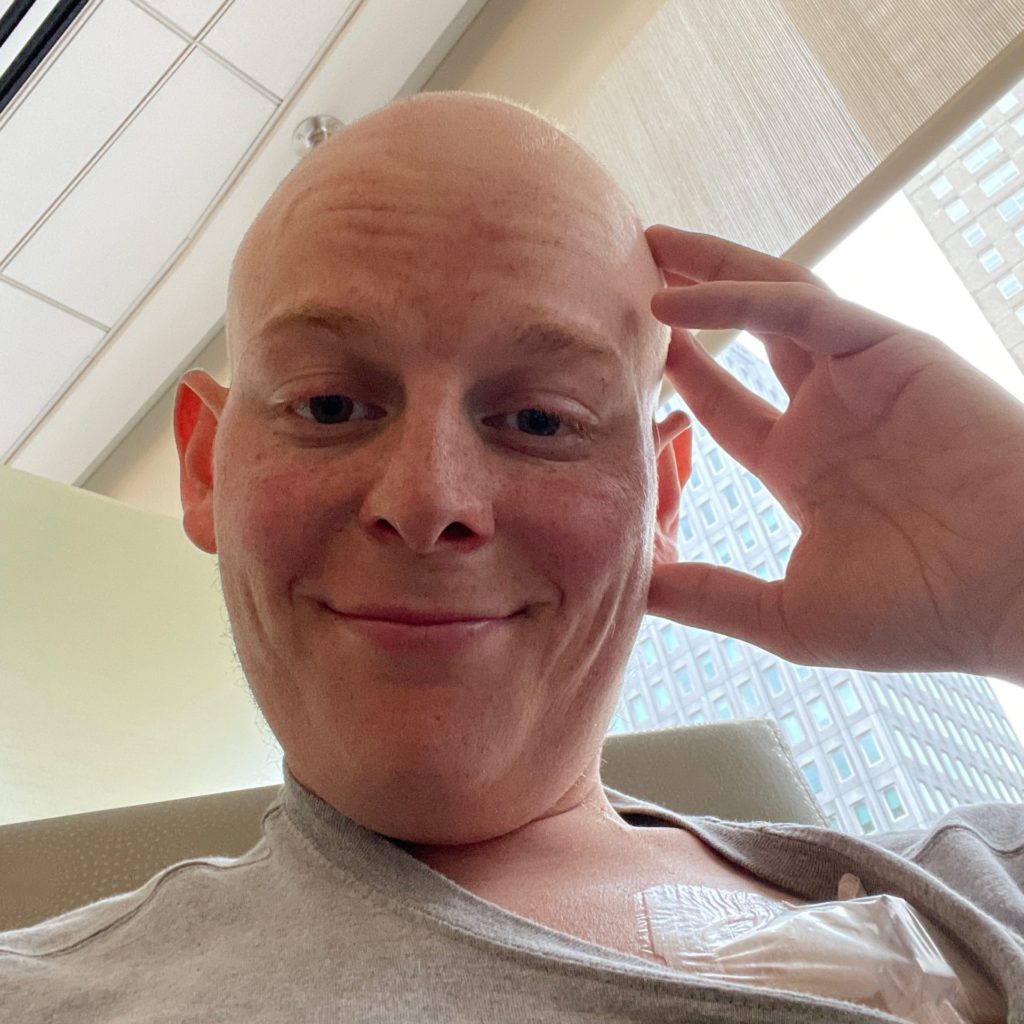
Josh was only 26 years old when he was diagnosed with 4B Hodgkin’s lymphoma.
After experiencing night sweats, fatigue, and an enlarged lymph node in his neck, Josh went to the Emergency Room. A lymph node biopsy and PET scan determined he had stage 4 Hodgkin’s lymphoma, with a subtype of nodular sclerosis.
Josh shares his journey, including processing the diagnosis, undergoing chemotherapy, and leaning on his support system.
Have your support system on standby at all times. There’s no way I could have done this by myself. Be educated; ask questions.
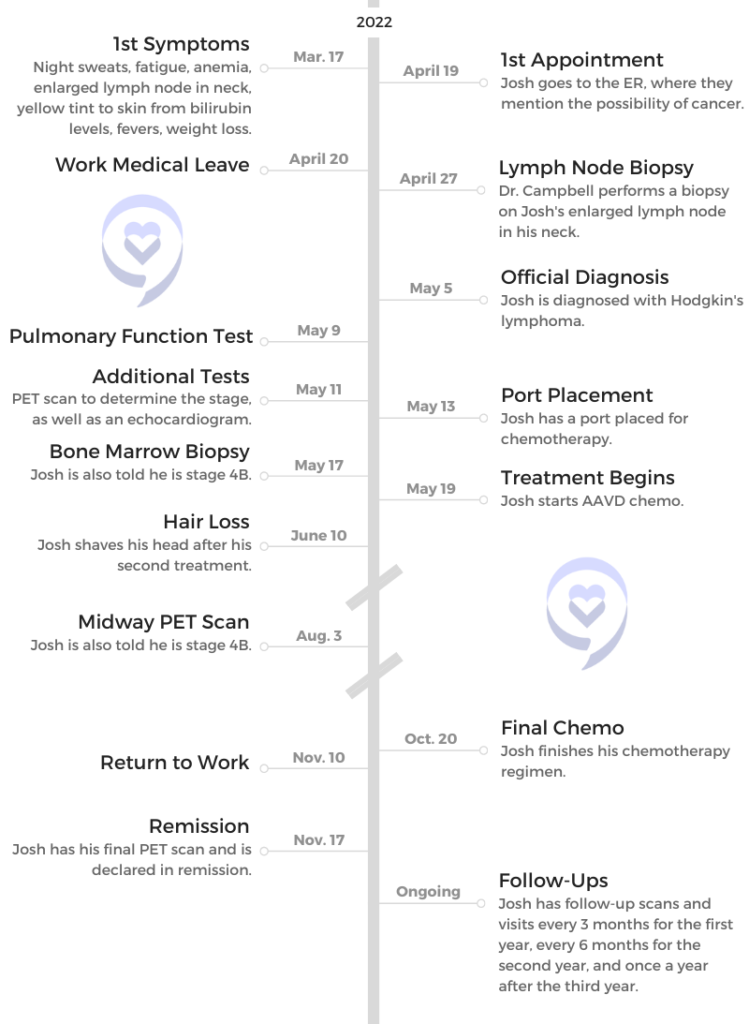
- Name: Josh G.
- Diagnosis (DX):
- Hodgkin’s lymphoma
- Nodular sclerosis
- Staging: 4B
- Age at DX: 26
- 1st Symptoms:
- Night sweats
- Fatigue
- Anemia
- Yellow skin (high bilirubin)
- Fever
- Weight loss
- Tests & Scans:
- Lymph node biopsy
- Pulmonary function test
- PET scan
- Echocardiogram
- Bone marrow biopsy
- Treatment:
- AAVD chemotherapy
- Adcetris (brentuximab vedotin)
- Adriamycin (doxorubicin)
- Vinblastine
- Dacarbazine
- 12 rounds, once every 22 weeks
- AAVD chemotherapy
This interview has been edited for clarity. This is not medical advice. Please consult with your healthcare provider for treatment decisions.
- Pre-Diagnosis
- The Diagnosis
- Treatment
- What was your treatment plan?
- 1st chemotherapy treatment
- What side effects did you have?
- What helped with the side effects?
- Having little energy toward the end of treatment
- Adjusting to life with cancer treatment side effects
- Needing support
- What was your reaction to the treatment going well?
- Finishing cancer treatment
- Remission and Recovery
- Chemo Brain
- Reflections
Pre-Diagnosis
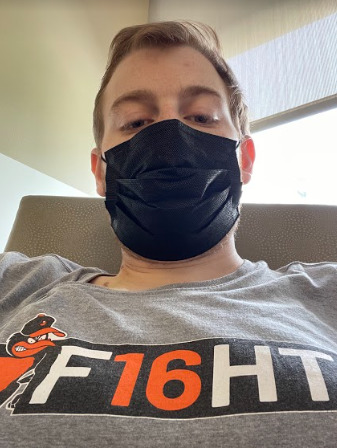
Introduction to Josh
I’m from Maryland, and I’m a huge Orioles fan [and] Ravens fan. I love sports. It was one of the driving things that helped me go through the journey that I went through.
I cook in a restaurant, and I’m very passionate about cooking. I never thought when I was younger that I would be a cook of any sort. I really didn’t really think about anything like that.
I actually wanted to be a journalist basically my whole life, but that didn’t work out, so I just kind of stuck to cooking.
I play video games. I’m just like the normal dude that just likes to hang out with friends, sports, hang out with my wife, and all that type of stuff. So not too crazy. But, you know, I have a crazy story, so I figured I’d share it.
1st symptoms of Hodgkin’s lymphoma
On St. Patrick’s Day of last year, I woke up. I felt like I had a fever. I felt out of it. I didn’t feel very good. I felt just blah. I’ve had them plenty of times. Honestly, I thought I had COVID for a little bit.
I went to work, and then I took some medicine. A few hours later, I didn’t feel any better. Around that time, my wife — girlfriend at the time, my wife now — touched my shoulder and where I had my lymph node at, and she said, “What is that?”
I said, “I have no idea.” Obviously, I didn’t really think anything of it. It didn’t hurt. It didn’t cause any pain. But little did I know, my body was fighting something.
Night sweats were ridiculous. I was sweating through my shirt in the middle of the night, waking up drenched. The sheets were drenched. I had fevers that would top out at 100.4. Wouldn’t get any hotter than that, and then it would just move on.
»MORE: Read more patient experiences with first symptoms of lymphoma
Escalating symptoms
Then my anemia started. I would be ridiculously cold for a really long period of time. It was around 55 degrees outside, and I was like frozen solid.
I had to sit in front of a space heater, and I was still freezing. I was like, “Something’s just not right.” I kind of just put it under stress, and I thought I was anemic. I recently bought my girlfriend an engagement ring. So I thought it was stress.
I chalked it up to that, as probably most men do because they’re scared to face the reality that something’s wrong. They think they’re all mighty. I did. I thought I would be invincible at 26. I didn’t think it was cancer.
All those things kind of boiled up. We were at a party, and I have a few friends that were nurses. They realized that I was a little yellow. That was because my bilirubin was so high. My liver was affected by this as well.
I thought I would be invincible at 26. I didn’t think it was cancer.
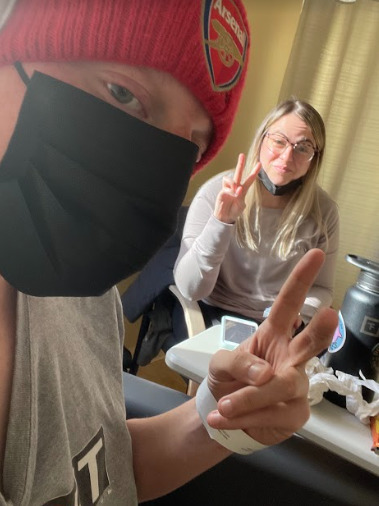
How long did you have the swollen lymph node?
I would say it was probably close to a month. It sounds crazy now thinking about it, but I just didn’t think it was anything. I really didn’t. I only didn’t think that because it didn’t hurt. The symptoms of lymphoma were so subtle, and they weren’t very telling.
I mean, I [have] sweat at night my whole life. I just get hot at night. I didn’t think anything of it. My dog sleeps right next to me. He’s like a furnace. So I just thought it was nothing out of the ordinary. I just thought it was stress.
Then days leading up to finding out, I started to feel pretty good. I didn’t think anything of it. I just started sleeping better. I tried to take care of myself better.
I had a lymph node pushing on my trachea. Any time I did exertion of any sort, I would have to take a step back. I honestly thought I was developing asthma or something. I [was] just making excuses after excuses.
I would have to catch my [breath]. I thought, “Something’s just not right.”
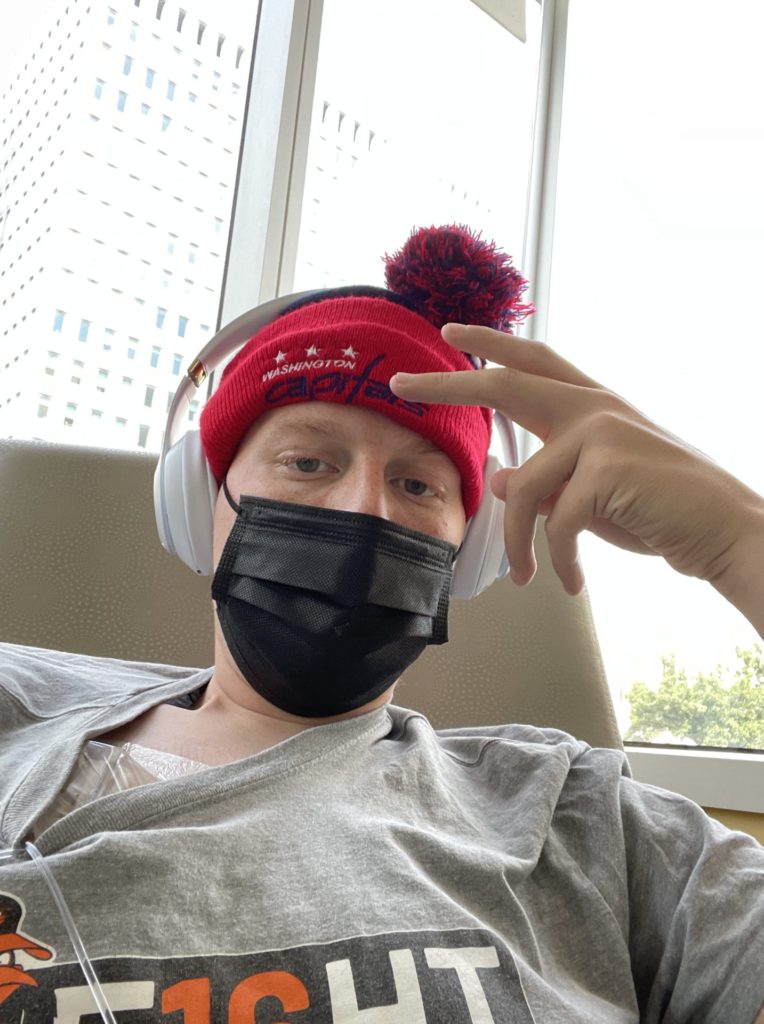
The Diagnosis
Finding out it was Hodgkin’s lymphoma
My girlfriend saw a TikTok of a guy that had a lymph node in his neck. It scared her because I had all the symptoms he had.
On Easter, I saw my sister [who is a nurse]. She recommended that I come up to her hospital, Hartford Memorial. I got blood tests [and] a CT scan. I had a feeling they knew something was up, but they couldn’t tell me.
CT scans showed that I had a lymph node in my neck, and in my chest, and my spleen was enlarged greatly. The ER doctor said it was a huge possibility that I had lymphoma.
He didn’t specify whether it was Hodgkin’s or non-Hodgkin’s because I didn’t have a biopsy done. I just had a blood test and a CT scan. From that point on, we kind of hit the ground running and didn’t look back.
How did you react to the diagnosis?
When I was fully diagnosed, I had an inclination that this was a possibility. I wasn’t shocked. When I first was told, my first questions were, “I have cancer?” That was it. I didn’t think anything of it other than, “Holy hell.”
Then I saw my girlfriend. She put her head in her hands [and] started crying. I thought to myself, “That can’t happen again.” I tried to be strong and make sure that she never felt like that.
It’s a crazy story because my nurse — my sister was my nurse, too. When she got in the room, I knew something was up. There was no reason why she would walk into the room with the ER doctor and have that look on her face. It spoke a thousand words.
The day after we hit up all these different oncologists. I’m very thankful that my in-laws work for Mercy Hospital in Maryland, and they helped me tremendously, getting me in the right places and the right doctors and meeting the doctor that did my biopsy not even a week later.
Focusing on getting healthy
On May 5th, I met with my oncologist, and he told me that I had nodular sclerosis, Hodgkin’s lymphoma.
I didn’t really have time to process anything. Everything was moving so fast, and you really only have one job. [Your job] is just to survive and just hope that every single chemo treatment goes well and you don’t have any complications.
You just put your foot forward, and you just put your head down. You get to work. Really, that’s all I thought about. Nothing mattered other than just trying to get healthy.
[Your job] is just to survive and just hope that every single chemo treatment goes well.
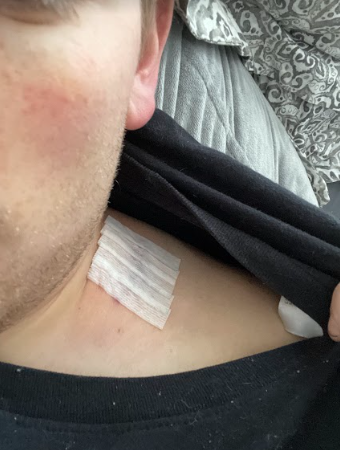
Have you processed your cancer journey now?
I would definitely say the process is still going on. [I’m] just thinking, “Man, I had cancer. That’s crazy.” I’m a pretty even-keeled, happy-go-lucky person.
I make jokes about what I went through. People call me bald. I don’t really care. I’m just that type of person.
I’m not a cancer or oncology patient first. I’m Josh. That’s who I am. I just went through a really tough thing.
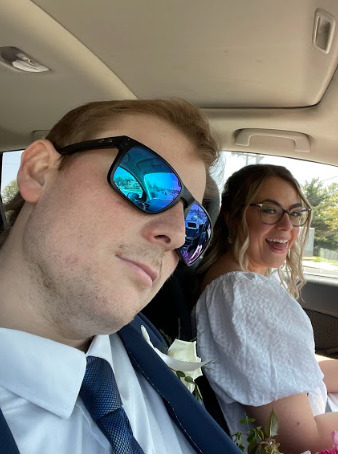
I think a lot of people would say the same thing, that they’re not that. I don’t think they want to be remembered as that. I don’t want to speak for other people, but personally, I’m just me.
Appreciating the relationships that grew from the experience
If I had never been diagnosed with cancer, I don’t think I would have the relationships I have. Don’t get me wrong, I don’t wish I ever had it, but the silver lining in all of it is the relationship and the trust I have with people. There’s nothing else that I can get from that.
The bond I have with my wife now. We had to get married. Well, we were going to get engaged very prior to that. I don’t have the best insurance, so we had to get married pretty quickly.
That would never have happened that quickly, and my bond with her is something that will never be matched by anyone in this world forever. I think of all the good things that came of it instead of the bad things.
Treatment
What was your treatment plan?
The PET scan just determined I was stage 4. It was everywhere, really. My chest, my stomach, my neck, my liver, my spleen. It was in my bone marrow. It was in a lot of places, so I had to start pretty quickly after they got the PET scan results.
I [wasn’t] able to freeze my sperm. That was something they really wanted to do because chemo really destroys your sperm. I didn’t even have time to do that. I got the results on a Tuesday, and Thursday I was in chemo.
My regimen was AAVD. I know a lot of people get ABVD. My lungs weren’t affected by anything, so my oncologist didn’t feel like bleomycin was necessary. I know a lot of people would drop that halfway through after the PET scan.
I had the Red Devil, which was the worst thing ever. I hear about it, and I did some research and had no idea what was to come of it. That’s why I’m still a little bald.
»MORE: Read patient experiences with doxorubicin (Adriamycin) chemo
May 19th was the first day of my treatment, and it was scary. I was going into a chemo ward and was the youngest person in there by 50 years. There are not many people my age that are diagnosed with cancer, and I didn’t really know where to begin when I walked in there.
You have your oncology nurse, you get your blood tested, and then you have to wait a few hours, and they hit you with a bunch of different drugs and medicine like that. You don’t really know what to expect.
I didn’t really have anyone to talk to going into this because I don’t really know anyone that had cancer, let alone Hodgkin’s lymphoma, because all different cancers and treatments are different. I really didn’t know what to do.
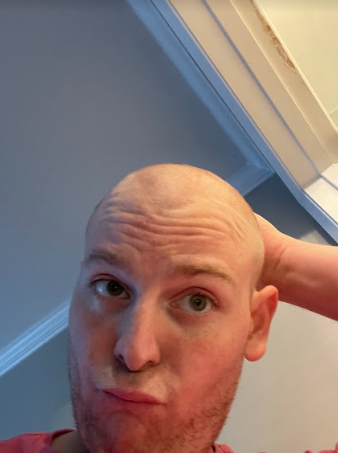
1st chemotherapy treatment
The first treatment was phenomenal. That was kind of like the telltale sign that things were going to look up. They tested my blood every single time I went, and they made sure I came back the next day just to make sure I didn’t develop anything else.
[I] went to check my iron levels and all that stuff because I was white as a ghost when I left the first treatment because it destroyed me. I had a good feeling that everything was going to work out pretty early because I saw my blood balancing out.
There are LDH tests that show how chemo is working. It was so incredibly high, and then it was basically cut in half after the first two treatments. I was very fortunate to have very quick results fast, and it helped me power through for the rest of the time.
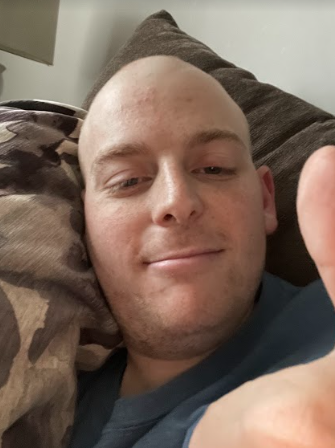
What side effects did you have?
I definitely was nauseous a few days after. I was also given a Neulasta shot that would improve my white blood cells, which was insane bone pain.
I definitely developed neuropathy in my fingers and toes. My toes and my hands, I still deal with that. But, you know, if there’s one trade-off, I guess I’ll deal with a little bit of tingling.
Then I lost my hair after the second treatment. As I was leaving the parking garage, I rubbed my hand around across my face, and I was already losing facial hair. It was that quick.
I was very tired, very bleh. After 9 to 10 days, I was starting to feel better. I was like, okay, chemo was really insane, but you just got to power through it, and you’ll be better.
You’ll have your good days, and when you have your good days, you do stuff. You just try to get out, take walks, drink a lot of water, [and] make sure you’re hydrated. Towards the end was really, really difficult. Even picking my head up was hard.
I couldn’t get out of bed sometimes. I never wanted to do anything. My energy levels were low. I would just say the energy levels and the nausea were really the main concern for me, other than the hair loss and the Neulasta shot that I was given.
What helped with the side effects?
I was actually given Claritin to help with bone pain. When I tell people that, they look at me like I have three heads. ‘Allergy medicine helps with bone pain?’ Yeah, it does. I have no idea why, and I don’t think anyone really questions it.
Medical marijuana in my state is legal, and I used that a lot to help with some of the pain and nausea. It would help me eat. I did drop a lot of weight, around 30 or 40 pounds. At least I’d just nibble on some stuff [and] drink some water.
I was fortunate enough that I had a lot of pain meds [and] nausea meds. From chemotherapy, I don’t think I ever puked. I think it was maybe self-induced maybe. Constipation would be the worst thing I can really remember I went through.
Having little energy toward the end of treatment
Other than the side effects, I was very fortunate in the beginning. As I said, towards the end, it was very difficult to almost do anything. I was in bed by 8 p.m. My wife would help me up and down the stairs. She would bathe me and clothe me.
I remember there was a time I was taking a walk, I saw my house, and I just stood there for 10 minutes because I couldn’t walk anymore. I was like, “I don’t care. I’ll stand right here. I don’t care. I just don’t have the energy to move or do anything.” So I sat there on the curb, and when I got the energy, I moved on.
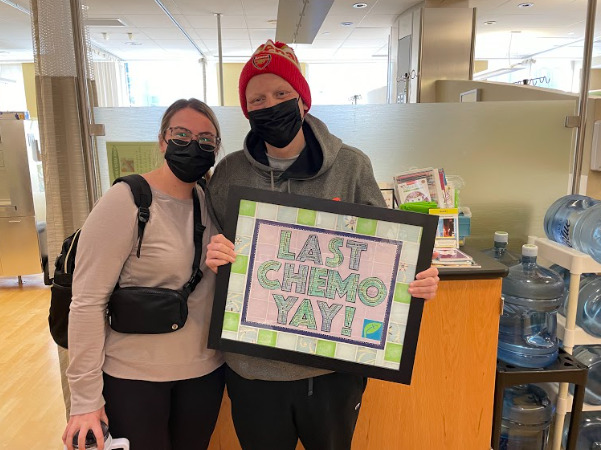
The only thing I wanted to do is get better.
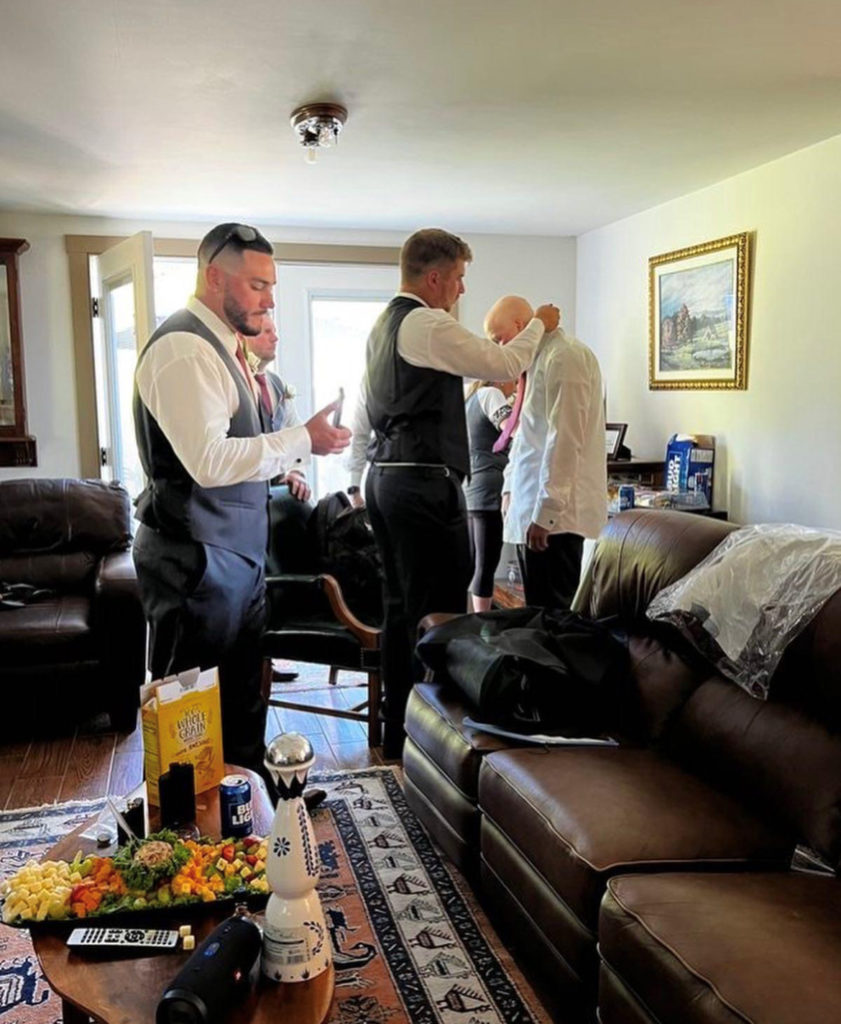
Adjusting to life with cancer treatment side effects
Everyone was understanding. I never felt pressure to do anything I didn’t want to or couldn’t do.
I had so much help. Everyone was willing to do anything for me, and I’m forever grateful for that. I would never feel bad for missing out on things. I was going through the worst time of my life.
I was in [one of my best friend’s] wedding. It was a day after one of my last chemo treatments, and all my friends did everything they could do for me. [I have] a picture [of] them basically putting a tie on me, and it was a beautiful picture that they caught. I just was forever grateful for that.
It was easy to do stuff on the good days because that’s all I wanted to do — get out and hang out with people.
Being in the same four walls every day for the last six months was annoying, but it is what it is. I didn’t have FOMO, fear of missing out on stuff. The only thing I wanted to do is get better.
Needing support
Getting around was very easy. I have a group of friends and family that were willing to do anything at the drop of a hat for me.
I don’t really remember much of the days because I was on so many pain medicines and drugs, but I knew I was there. All I kept telling them was, “Just get me there, and I’ll be there.”
Put a chair there [and] have someone stand next to me just in case. My balance wasn’t always great; it was the neuropathy and all that stuff. So I was like, “Just get me there. That’s all I need you to do, and I’ll figure it out. I always tend to.” That was just the thing I was thinking about.
What was your reaction to the treatment going well?
I was told this was a very curable disease from the get-go. That was embedded in my mind. Hodgkin’s lymphoma is a blood cancer. My oncology nurse told me that when the chemo is injected in my port, it goes right into my bloodstream and basically hits the cancer cells head-on and eliminates them almost immediately.
Hodgkin’s is very curable. Unfortunately, there’s not a lot like this. The percentage rates are very high, even in stage 4. My oncologist said, “Stage 4 Hodgkin’s isn’t stage 4 lung cancer.” It’s just not even comparable.
I had that mindset that it was very curable at the get-go, so I was ready to fight immediately with all the confidence in me. When I started to see it work — I loosened up, but I kept my gates up because I just didn’t know what could happen.
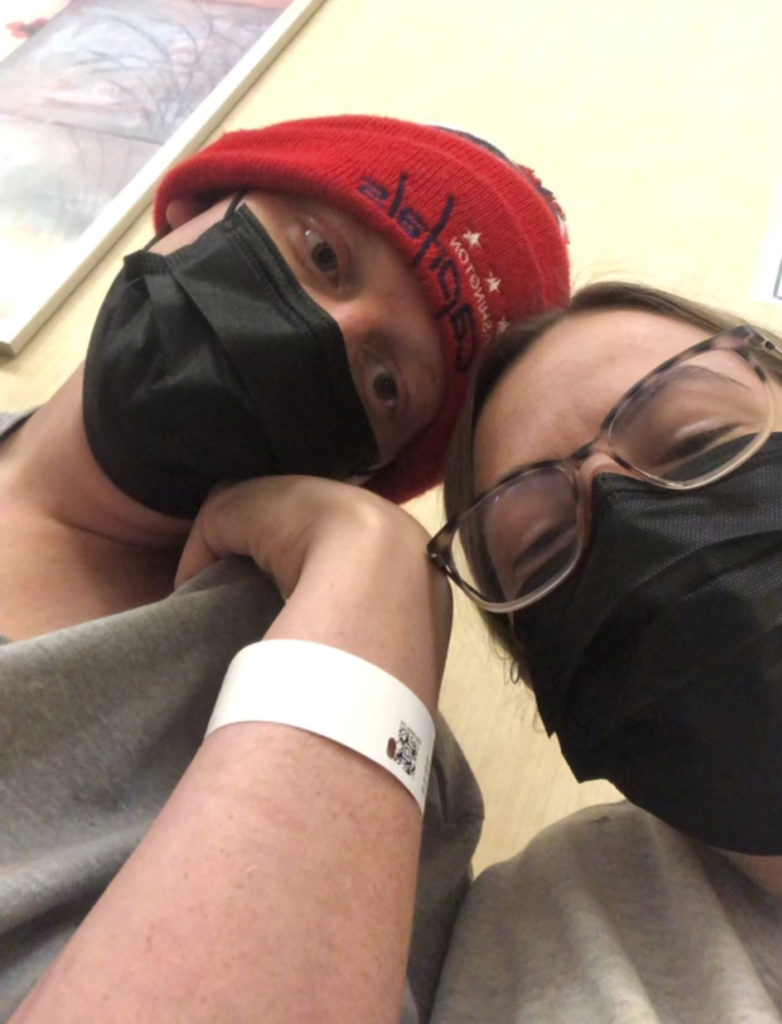
Finishing cancer treatment
You never know. You [could] become refractory towards it. It could stop working.
It fueled me just to finish this out. Twelve rounds of chemotherapy was awful. It was every two weeks. But I knew at the end of the tunnel, it was going to be worth it
I knew everything I worked for was going to be worth it, and I just wanted to get back to what I was doing before I was diagnosed with Hodgkin’s. I just wanted to keep fighting. I read success stories. That’s why I wanted to share my story.
I would read The Patient Story, and I would see these amazing stories of these people. After I found out I was 4B, I read the stage 4s because I couldn’t really relate to the stage 2s because it was in a different spot.
I didn’t know anything about Hodgkin’s. I was pretty far behind everyone else. So I was like, “Okay, how crazy is this going to be?”
Remission and Recovery
What it was like to reach remission
The treatments worked, and by August I was in remission. They just couldn’t tell me that because God forbid something happened and it came back as I was getting treatment. So I just had to keep going, and I didn’t have any metabolic activity in my body.
Telling everyone that was awesome. They were so happy, and it was cool. I was ecstatic to find out that it was working, but I always knew you can’t stop. You’ve got to keep going. You got to put your head down and just finish strong.
My wife made sure I was drinking water, eating what I had to. You can’t get lackadaisical because it will take you. It will take you.
I would read The Patient Story, and I would see these amazing stories of these people.
Do you experience scanxiety?
Yeah, for sure. I’m in the process of getting scanned every few months now for the first year, or the next two years and three or five years.
I have a scan coming up in a month, and my oncologist was telling me, “Hey, don’t live around the scan. Just live your life, do what you need to do, and then figure that out when that day comes because there’s nothing you can do.”
Even if there was anything, there are still a lot of different tests that you have to go through. Having an oncology appointment is scary no matter when it is and what it’s about.
»MORE: Patients describe dealing with scanxiety and waiting for results
But I’ve been very fortunate to have some of the best doctors ever, and Maryland is known to have great doctors. We have great hospitals here.
I definitely will have scanxiety. I know it’s going to come like a week before. I know it’s going to happen. So I try to take Ativan [to] help calm me down. It helps stop my thoughts from racing and comprehend everything.
You can’t help anything. You just got to be there. Scanxiety, for sure, is going to be a thing for me six months to a year to two years. It’s already kind of happened.
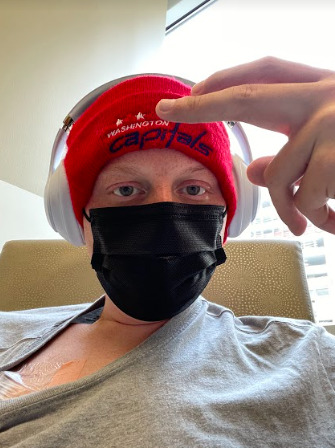
Feeling confident for the future
I have the best doctors, and if anything was to happen, I know I would be able to beat it again. I feel very confident and I would feel even better if nothing ever happened. I would be even more ecstatic.
You can’t help it. I couldn’t stop myself from getting cancer. I don’t know if I can stop myself from getting it again, but I put my foot forward and do what I’m asked.
What was it like telling your family and friends that you went into remission?
It was euphoric. It was better to tell them than when I was told. I got a scan on Wednesday, and the next day — because it takes a few days for the radiologist to read it — I was on the phone with [them], and I put it on speaker.
My wife was in the room and she started crying, and I started crying. Then I just told everybody. I texted everybody, and I called my dad and my mom. They were happy. They were ecstatic. They were so happy for me.
My father just wanted a good scan. He didn’t think it was going to be the greatest scan. He was excited, and he calls me his hero. Hearing those things about how I inspire people, it’s really nice to hear because I wouldn’t be able to do those things without them.
When I got the final call in November that I was in remission, everyone was so happy. Looking back on it, having all the help from those people, I knew how sincere it was.
What has it been like to get back to your life after cancer?
I would say I’m shocked myself because from where I was back in October when I finished, I would never think I’m here now in February, working five days a week, exercising, and doing what I was doing before. I feel healthy. I feel great. I don’t have many setbacks.
My energy levels are pretty good for the most part, I would say. When I first started to get back to work, I couldn’t really finish a shift. I work in a restaurant, so I’m on my feet very, very often. But now I’m ready to go. I feel great.
I try to live in the moment because I know the next day might be a little bit more tiring because that’s how I felt when I was going through treatment. I wouldn’t get tired doing a task. It would be the next day. I would be like, “Wow, I’m just exhausted.”
I look at that, and I’m feeling pretty good. I don’t overdo it. I don’t really try to do anything crazy on my days off. I hang out at my house and recuperate and try to regroup because I know [the] next five days I probably have to work.
I feel very great. I feel healthy. Very fortunate of how everything worked out and transpired because I was told that it would take a year for me to get back to where I was.
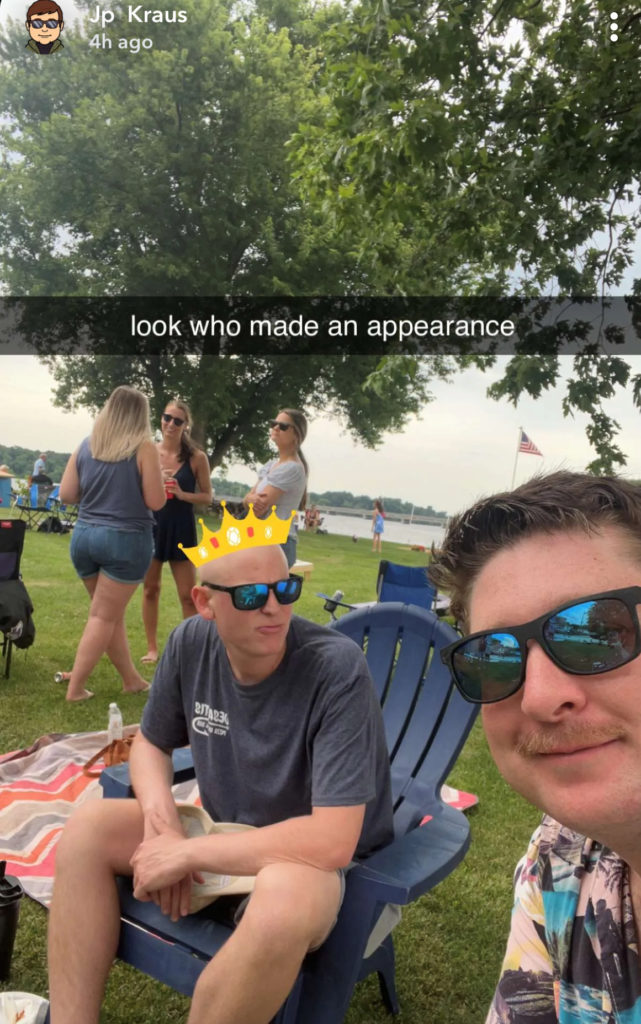
Not pushing yourself to progress faster
I’m not a very pushy person. I think if I was younger, I would for sure think, “Wow, I’m missing out on so many things. I need to make this a fast track. This is just annoying and bogus.”
I’ve tried to stay calm and allow the process to play out. I’m not going anywhere, so I don’t have to really push myself. I don’t have to prove anything to anybody because what I just went through is enough in my eyes.
When I get tired, I lay down. I don’t care. I’m not going to push myself. I want to relax. I felt like one of the things I took seriously is listening to myself. You have no reason to push yourself because you’ve already pushed yourself to the limits.
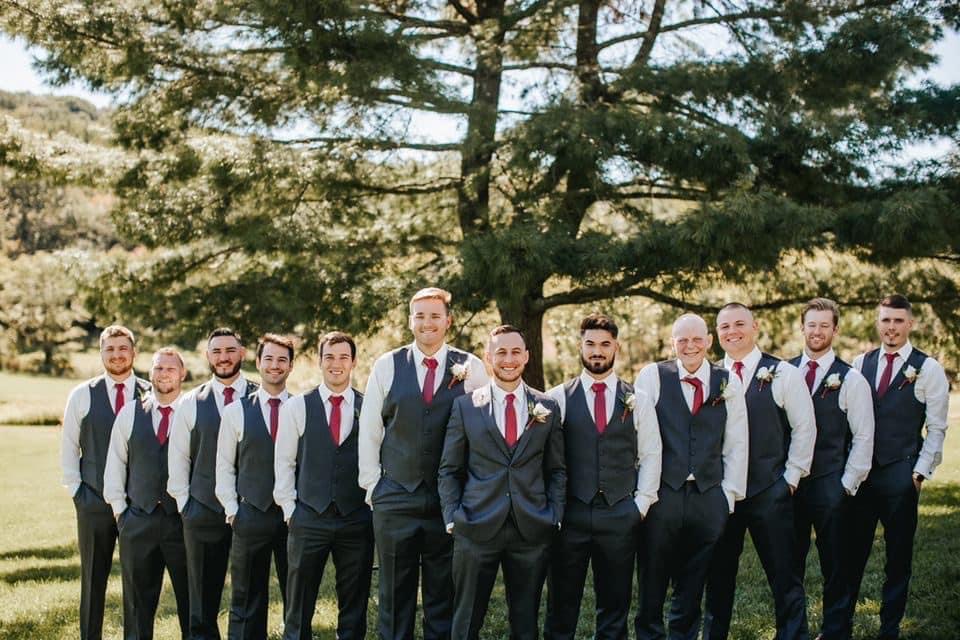
Going through treatment — honestly, 10, 11, 12, the last three treatments were awful because I knew I was good. Doing those things just made me into a person that [realizes] no one’s going to do it for me. I didn’t have a choice.
I was only 26. I can’t let this take me, and I just put my head down. When I get tired or I get exhausted, I think about how tired I was back then, and it doesn’t compare to it. I allow my thoughts to process and everything to play out before I make any decisions.
Chemo Brain
What is chemo brain?
Chemo brain is for sure a thing. It’s cloudiness. One of the very first moments I remember having chemo brain, my buddy was over with his girlfriend.
We were eating dinner. We were talking, and I looked right at him and couldn’t think of his name. And I’ve said his name a million times, and it’s like, “I know who you are, but I just can’t say your name.”
The fogginess of chemo brain and being able to remember things and process things a lot slower than people. Trying to think of the right word to say, too.
Thinking of what to say quickly and respond quickly is difficult sometimes. It’s definitely something that you have to deal with.
When you’re going through treatment, you kind of have to play those mind games. You have to do word puzzles to get your mind going. You can’t stay stagnant because you’re just going to kind of rot.
I was always told [to] do crossword puzzles or write things down. It makes you so cloudy and foggy, and you just forget things very quickly. I have my wife just remember, like, “Hey, what did I do? What did I say?”
Cognitive changes after chemotherapy
It gets better, but it’s definitely something that you have to deal with. You’re kind of embarrassed because you don’t want to seem stupid. You don’t want to seem dumb. You forget things to say or the right word to say.
For example, I cook in a restaurant. When I look at a line of tickets, it’s kind of hard to process everything that’s going on. The bullets are flying, but it’s kind of hard to be like, “I got to do this.” Then you kind of forget about it, and you kind of keep looking.
It takes just longer to process things. Keep on your toes when you’re going through treatment. Keep your brain going. Don’t sit there and watch TV all day. Try to keep your brain working.
Chemo brain is definitely something that’s difficult to explain. You don’t need to be embarrassed because it’s definitely a thing. You just don’t want to sound silly when you’re speaking.
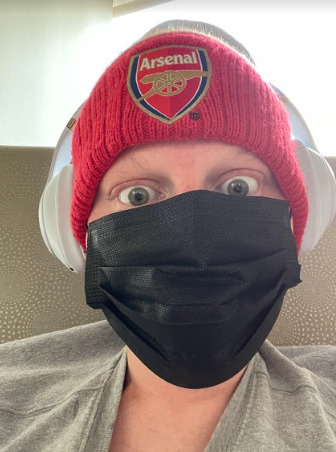
What did you think of chemo brain before you experienced it?
My initial thoughts were more of it might be a fogginess, maybe a little forgetfulness. I never thought I would forget my best friend’s name. That wasn’t something I would think about.
I thought I would just be cloudy or not be able to remember certain things. It’s still a thing.
When you’re going through [cancer treatment], make sure someone’s with you, write things down or even record it. You can always go back to it because you can’t alter a recording if you have it all written or recorded. You might forget things.
Chemo brain is a really huge thing. I think it’s not really spoken about or talked about, because going through treatment, yeah, it is a thing, but when you’re out of it… I’ve been [done] three months, and it’s still a little difficult trying to comprehend everything that’s thrown at me.
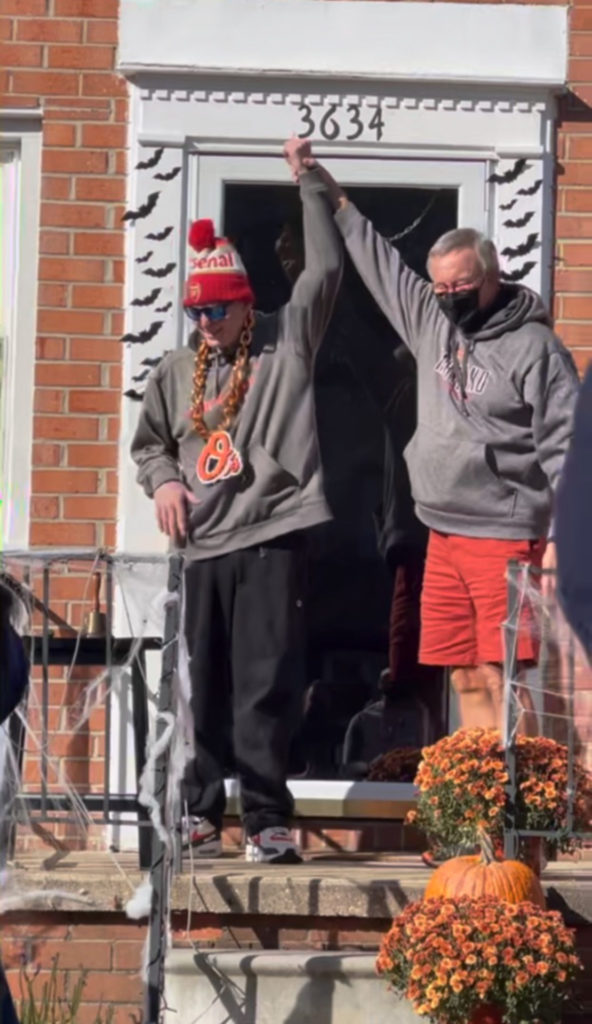
Difficulty writing and texting
It’s almost embarrassing to track back, but you just have to buckle down [and] think about it. I mentioned to my friends when I’m writing something down, I have to think about it really hard.
For a normal person that didn’t go through chemo, you don’t think about it. You just do it because it’s something you’ve been doing since you were a kid in school, which is writing things down. Now you [have] to think about how you’re writing and what you’re writing about.
Texting is very difficult. I have to read the text like three or four times before I send it so I don’t sound illiterate. It’s very hard and difficult. It’s like what I was saying in my head is what I wanted to say, but it just didn’t come out that way.
Advice for dealing with chemo brain
Keeping up with things. Don’t let yourself rot. Keep yourself active as much as you possibly can, because there are a lot of things you don’t want to do.
You’re not going to want to do really anything. You’re going to want to sit there and sleep. When you can, just get to it. Read an article, do a crossword puzzle, and write your thoughts down.
You might forget how you feel, or how you might [remember], “Hey, this was my symptom.” For my chemo brain, I’m not going to remember how I felt two weeks ago from a pain med or drug.
I write things down so I can refer back to it. Writing things down is a huge, huge tool for someone that might have chemo brain.
It’s just another battle that you’re going through when you’re trying to live your life and trying to survive, really. So I think just having someone around you, helping you process it, because I think chemo messes with you from your head to your toes.
Writing things down is a huge, huge tool for someone that might have chemo brain.
Emotional effects of chemo brain
It makes you emotional and makes you upset. It makes you mean; it makes you happy. It just messes with everything, so your feelings are just out of whack. Having someone around to kind of validate and try to settle you down helps, for sure.
Chemo brain doesn’t only affect your comprehension, but it also messes with your emotions. You could be running hot one day. You could be really sad one day. You can be really happy one day.
So just having someone around you be like, “Okay, the situation isn’t as bad as you think it is right now.” Just relax, take a deep breath, and allow the process to kind of play itself out.
If there’s anything happening, you hit up your oncologist or your nurse practitioner or whoever you need to. Reach out to them immediately if you find something wrong because your brain plays games with you when you’re going through this.
Every pain, every bump, every bruise, you’re like, “What is this? What is that?” The brain plays games on you. I know it’s hard for people to have 24/7. I was fortunate my wife worked from home, and she took care of me every day.
Every second she sacrificed, and she definitely helped me navigate through that mental part of everything. Have someone around you at all times. It really helps you.
Reflections
Importance of a support system
Have a support system. Really, you have to. You can’t get through this by yourself. Even if you think you can, you just can’t. It’s not fair to you. It’s not fair to other people.
I think being a man, we have our gates up. We’re protective of ourselves, and we try to not let people in. And you don’t want help. You don’t want to be given things because you’re going through something.
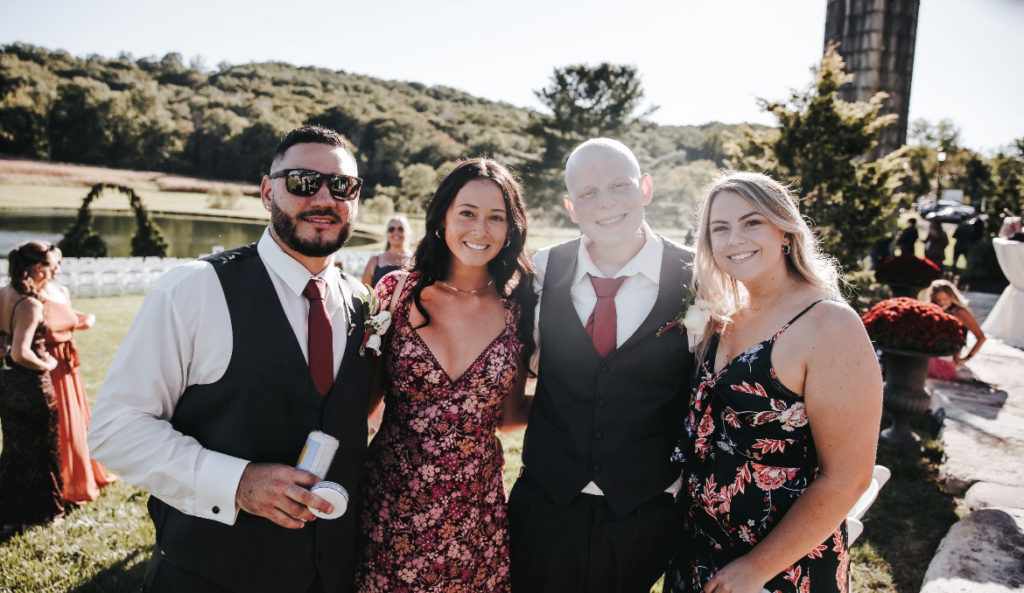
You don’t want to say, “Oh, I have cancer, so you have to do this for me.” It’s way bigger than you. People want to help you, so allow people in.
In the beginning, I was a little wary because I didn’t want to disappoint anybody. I didn’t want my parents to see me bald. I didn’t want them to see me 40 pounds lighter than I was. I didn’t want them to see how tired I am.
But at the end of the day, they want to help me. They’re my parents, or they’re my friends or family. Letting people in is something that you should allow people to do because you can’t do this by yourself. It’s unfair to you and to them.
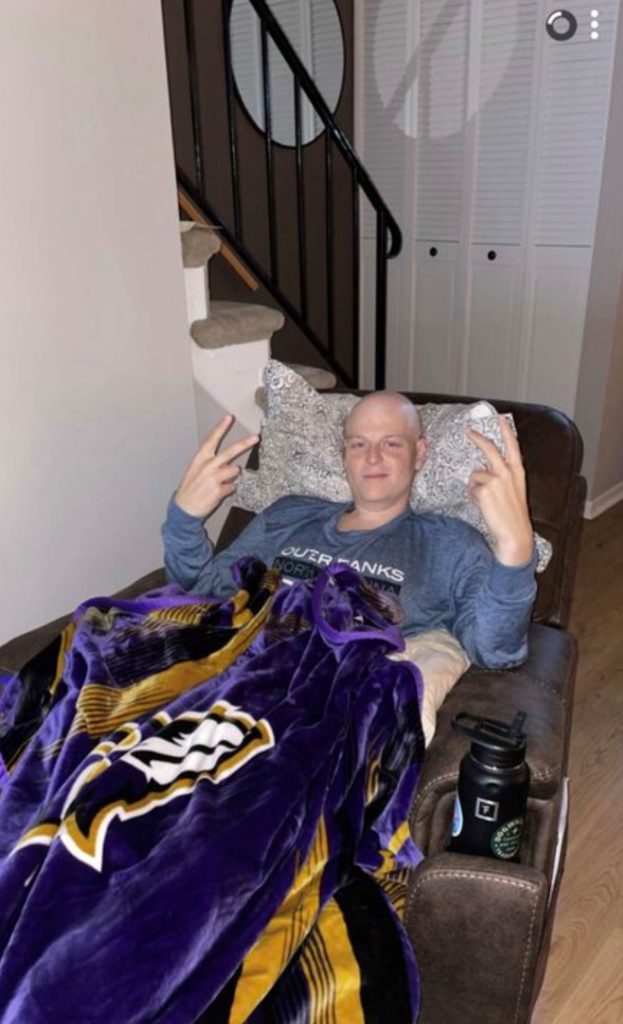
Just take it one treatment at a time, one day at a time.
Letting your support system help you
Allowing others to do things like pick up groceries or help cook dinner, bring food over. The simplistic things that can really help you get through it. It’s a long process. It’s a long journey that you’re going to have to go through.
Six months was a long time. It felt like an eternity. But having my friends and family come over almost every other day, basically, [helped]. I had a set schedule for a little bit. My mom [would] come over on Wednesday; my dad [would] come over on Tuesday.
I watch baseball every night, and have an outlet really for something that happened. I’m a huge Orioles fan, so looking forward to 7 p.m. baseball games was the best thing ever for me.
It was something that was an outlet for me just to kind of look forward to. Find an outlet and let people in. Let them help you. You might think you’re a macho man, but you’re not.
Reframing treatment timeline
There’s nothing in this world that will prepare you for this, but take every day at a time. One day at a time. And I think that really helped me towards the end because you’re thinking, “Man, I got 60 days left in treatment. This sucks.”
It’s an unstoppable number to even think about. You have to go through 60 more days. So another thing I would think about is just think about one treatment at a time. Like, “Okay, I got five days until my next treatment. Four days until my next treatment.”
That’s one more down, and then the clock resets. I would get my Neulasta shot a day after chemo. It had to be 24 hours after, and my wife would be like, “All right, 13 days till you got to see these guys again.”
Just like that. You got 13 days to recuperate and kind of stay on your P’s and Q’s and stay hydrated. Don’t think of it as 60 days. Just take it one treatment at a time, one day at a time.
What advice do you have for patients and caregivers?
I would say have your support system on standby at all times. There’s no way I could have done this by myself. Be educated; ask questions. Make sure somebody is there with you during oncology appointments because there are so many things flying at you, you don’t even know what’s going on.
You just kind of take bits and pieces of what your oncologist said. You’re going to be very forgetful.
Chemo brain is a huge thing. That’s another thing I struggled with. Just maybe counting or reading things in large portions is difficult for me trying to comprehend stuff. It’s not the easiest thing in the world.
Having people around you to help you process things at appointments and stuff. Have an outlet. Try to find a support group. I was part of a support group via Facebook and in real life, just to talk about things.
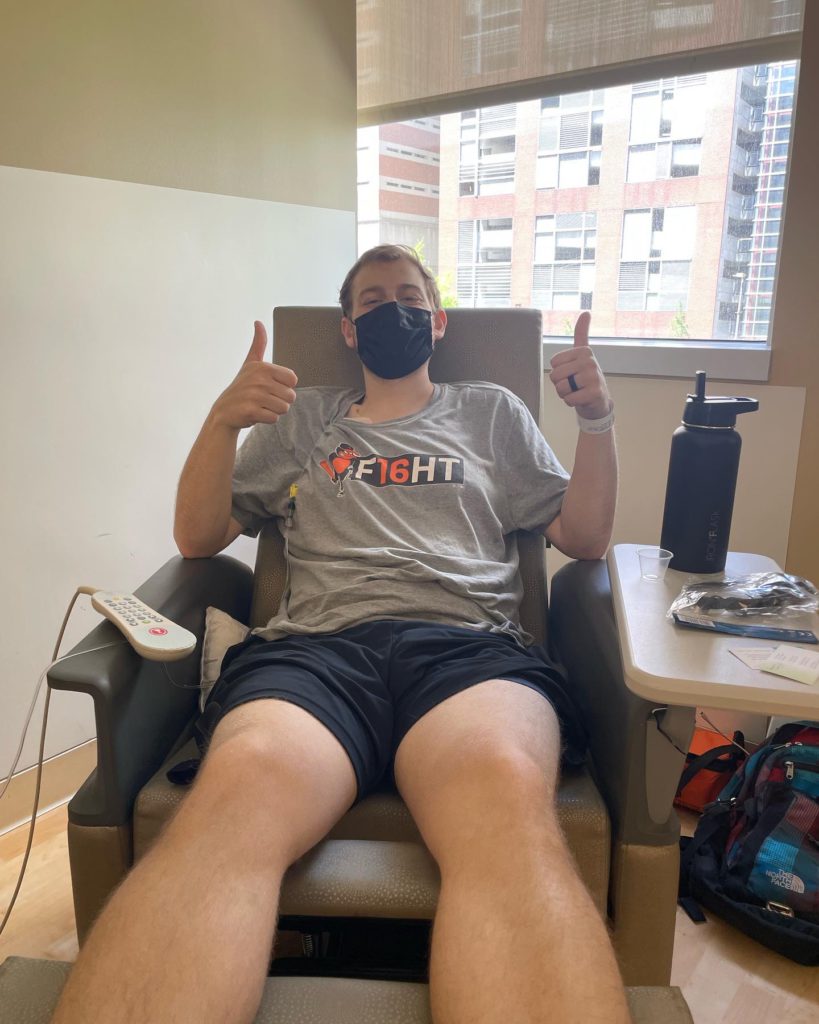
One thing I’ve really realized [is] it’s hard for people to even talk about that haven’t gone through this. It’s like you can’t relate. You can’t get to their level. They won’t get to your level.
You go through this thing during chemo. You turn into a different person. You’re not happy. You’re not joyful. You’re kind of mean. You’re kind of an SOB. It is what it is, and you’re just trying to find an outlet.
Reaching out to people to try to find your space. Really try to find your space, and they will validate your feelings. I was part of a support group for people that unfortunately lost people.
Again, I was the youngest person in this little support group. Then they helped me. They let me validate my feelings, and they were like, “This is all normal.” It was headed by an oncology nurse, and she said, “Yeah, this is normal.”
She put me in contact with this guy that I would consider a friend, and I never met him. He helped me because he was going through treatment, and he ended right before me. He’s in remission. He’s doing great.
I’d ask, “Hey, man, did you go through this? What did you do for that? Is there anything I should be doing? Is there anything I shouldn’t be doing? How was your port removal? How was your final PET-CT? How does all that work?”
I wasn’t too sure about anything. After treatment, did you have to wait a month for your final results? Because I didn’t know that. I mean, it makes sense now. But just kind of having a support system. Read. Educate.
I went to The Patient Story. I found a bunch of awesome stories, and it helped me. It let me feel like, “Okay, this is normal.” I read someone’s [story] that said brushing her teeth was hard. Okay, that’s something to be wary about. Putting baking powder and Epsom salt and water for a bath to help your bone pain and nausea worked out. I read that, too.
When I read all that stuff, I was like, “This is the first thing I want to do after I’m good to go. I want to reach out to this website or these people, and I just want to tell my story because of how much it helped me. I want to help somebody that’s my age or whoever that’s just so scared and has no idea what to do.”
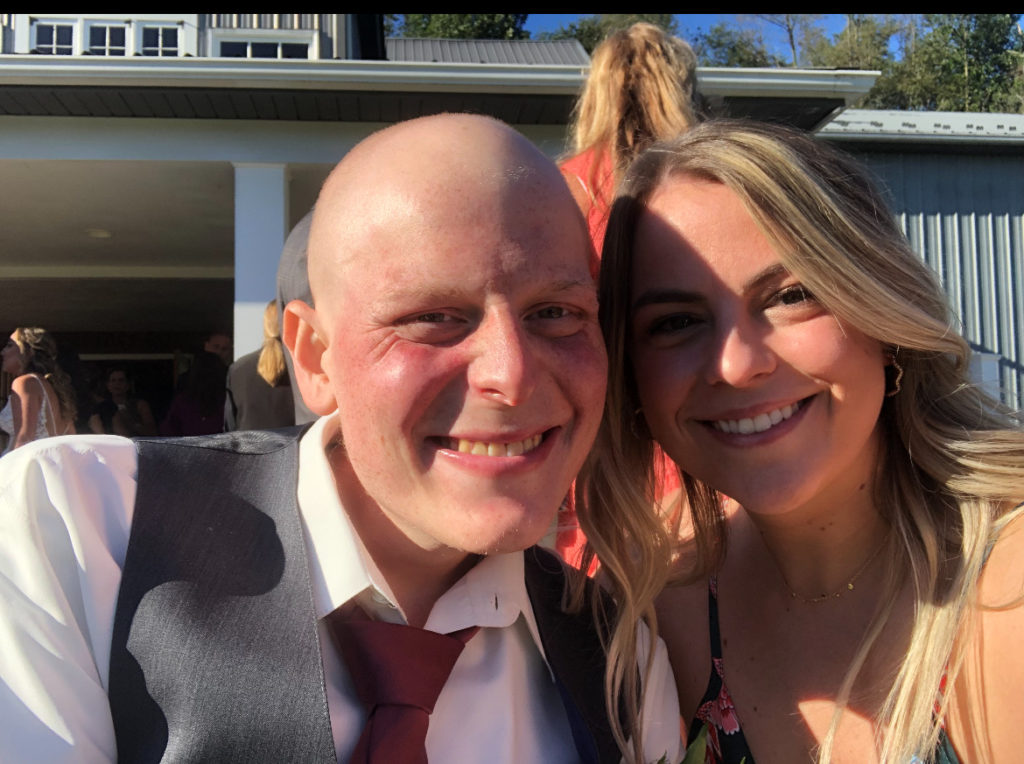
Inspired by Josh's story?
Share your story, too!
More Hodgkin’s Lymphoma Stories
Amanda P., Relapsed Hodgkin’s Lymphoma, Stage 4
Symptom: Sudden, unexplained weight loss
Treatments: Immunotherapy, chemotherapy, stem cell transplant (autologous)
...
Amanda P., Hodgkin’s Lymphoma, Stage 4
Symptoms: Intense itching (no rash), bruising from scratching, fever, swollen lymph node near the hip, severe fatigue, back pain, pallor
Treatments: Chemotherapy (A+AVD), Neulasta
...
CC W., Hodgkin’s Lymphoma, Stage 4
Symptoms: Achiness, extreme fatigue, reactive rash on chest & neck, chills, night sweats
Treatment: ABVD chemotherapy (6 cycles)
...
Amina V., Hodgkin Lymphoma, Stage 4B
Symptoms: Severe fatigue, shortness of breath, night sweats, bloating and stomach distension after eating, abdominal pain, little to no appetite, high fever, lump in the pelvic area
Treatment: Chemotherapy
...
Lisa S., Nodular Sclerosis, Stage 4A
Symptom: Extreme lower back pain
Treatment: ABVD chemotherapy
...
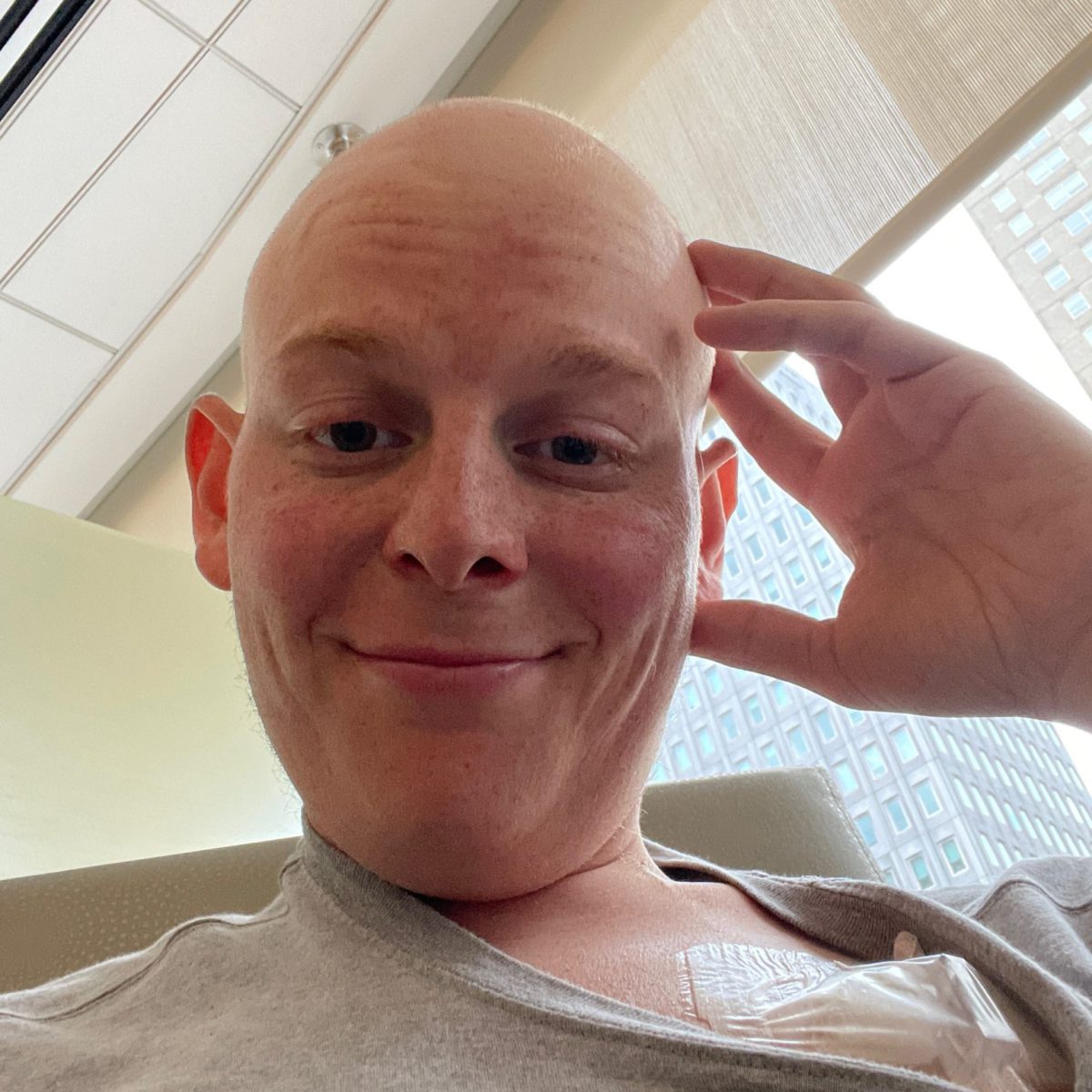
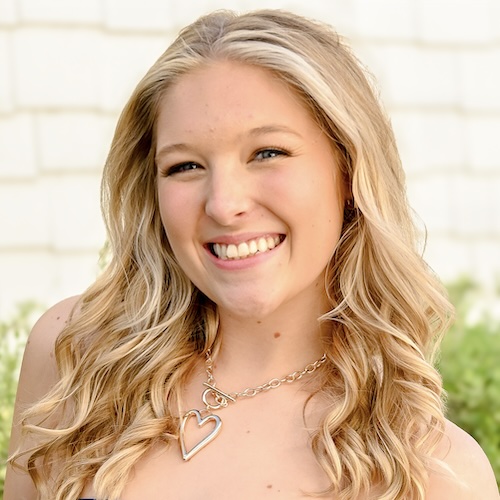
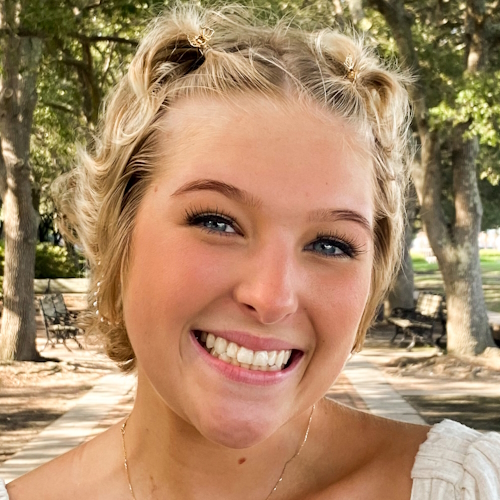
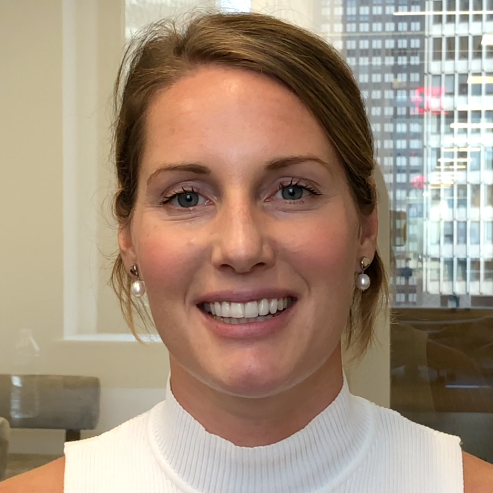
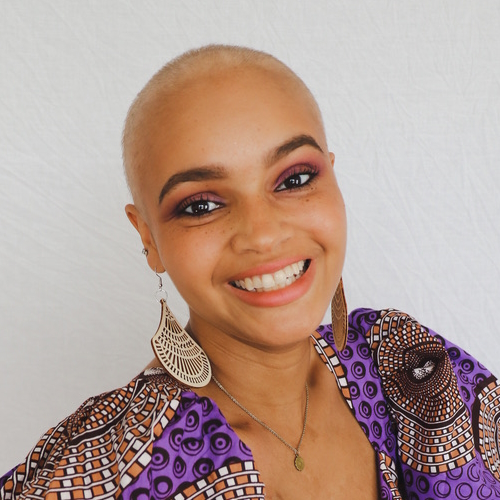
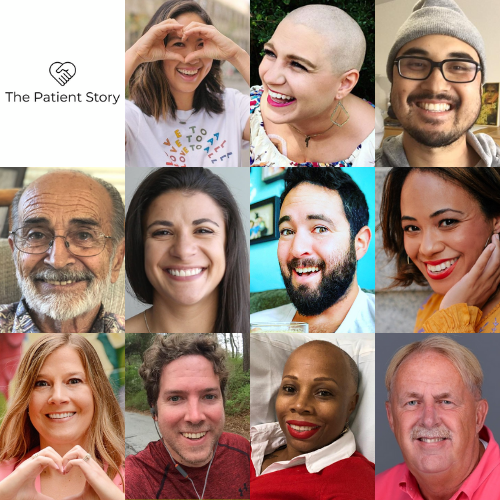
2 replies on “Josh’s Stage 4B Hodgkin’s Lymphoma Story”
Thank you for your sharing your story!
This gives me hope thank you.
Im grateful you talked about chemo brain. I say i know i smoked alot of pot growing up and my brain cells are burnt, but this is no joke. Congratulations on remission.
Born and raised in Maryland. GO Ravens and Orioles!!
I have read all the above and have compared it with what I’m going through with lymphoma. It has helped me a great deal in knowing what it is and what you can do about it. I am 89 years of age and hopefully can register what has been written by Josh whereby my symptoms are very similar to his. I felt like he was experiencing the same as me for I know exactly how he felt and I wish him well.